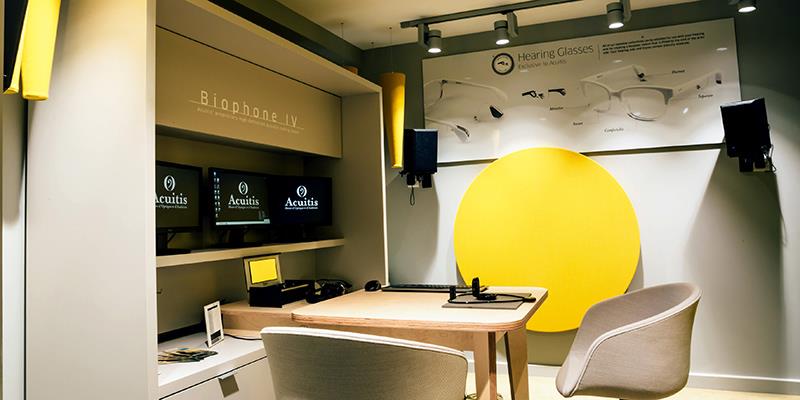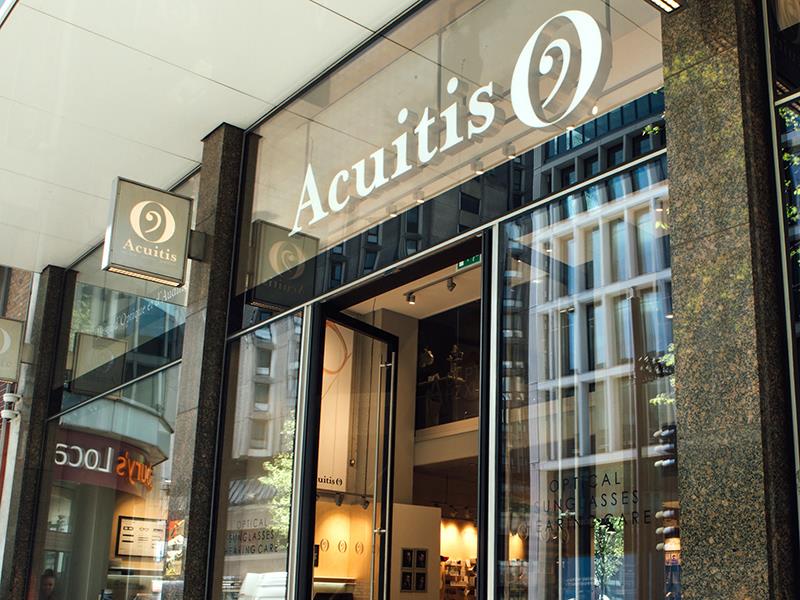How best to integrate audiology services within optical practice has been a question the industry has been grappling with for several years.
Recent arrival to UK optical retail, Acuitis, did not have that problem. Founded in 2010, the company, which now has 55 practices around Europe, has always offered hearing and eye care services in tandem. Father and son founders, Daniel and Jonathan Abittan, wanted to create a model that helped people with both of their two man senses and saw the synergies between the two specialisms.
Opening practices in the UK has created a number of opportunities within audiology. ‘In France patients have to go through a medical route to get either an optical prescription or an audiogram. People will come in to the store having already been diagnosed and are looking to purchase. In the UK, we’re very fortunate that we can do the diagnostic part onsite, which makes hearing care much more accessible for customers,’ says Diane Newman, managing director of Acuitis UK.
Creating a hearing experience that resonates with the relaxed, modern optical patient journey has been a key target for the company. The whole space is more Apple Store than optician and this carries over in the audiology testing rooms.
Very little equipment is on show within the specially soundproofed room. The colours are muted and the design is modern – it is definitely a relaxing space for the patient. ‘In terms of the look and feel of the store is very different,’ says Newman.
‘We encourage people to explore, which you don’t feel in some of the more clinical type environments that you go in. Particularly with the way the glasses are displayed, it’s very much around pick up, touch, feel, try, play with them and things like that.
‘We try and do as much as we can with that in hearing too, so we have the hearing centre, where you can look at all of the accessories and we have a screening system downstairs.
‘There is a real stigma around hearing loss and people can feel it is an indicator of them getting old, so they’re not the most relaxed when they come for a hearing test. We’ve been able to give them an environment like this where they’re just sitting and chatting rather than stuck in a claustrophobic booth with the door closed,’ she adds.
Patient journey
Having a space where the patient feels comfortable is a must, because the range of services and tests offered by the company means chair time is high. ‘I’ll see a patient for an hour and a half or so initially, then again for the same amount of time if they decide to invest in the hearing aids for fitting,’ says hearing aid audiologist Atish Keshav.
‘Patients get to come in, have tea or coffee and relax, with time for me to have a proper conversation with them to understand their hearing and their needs.’ For example, younger patients may attend a lot of meetings and spend their time in built up, noisy areas whereas older patients may not go out as much so hearing aid needs tend to focus on using the telephone and watching the television.

Acuitis feel offering eye care and hearing care provides a better offering for customers
General checks of the ear follow and Keshav will make sure they are clear of wax – which can be a major issue for some patients. An important part of the services Acuitis offer is ear wax micro-suction. Keshav says many patients choose to have their ears irrigated elsewhere, but this carries an increased risk of post-procedure infection and is the only method offered by GP surgeries. Acuitis charges £60 for micro-suction and waives the cost if a hearing aid is purchased.
Tympanometry is another part of the Acuitis hearing check that is seldom offered by optical competitors. ‘Measuring how well the ear drum moves is perfect for when a patient comes in and complains of feeling “bunged up” or has a sensation of having fluid in the ears. It is something that a lot of ENT clinics offer it, but it isn’t something you see on the high street,’ says Keshav.
‘I’ll then carry out an audiogram and go through their results with them, looking in particular at the speech and noise test results and showing them why they’re missing certain parts of conversation,’ he adds.
‘It’s mainly the consonant sounds they miss out on and that’s where you get a lot of clarity and sharpness. They normally tend to have what we call a higher frequency loss, which has been deteriorating over a number of years. That then leads me on to talk about how hearing aids can improve their lives, showing what the device will do and how well they amplify certain sounds.’
The company offers a wide range of hearing aids, ranging from approximately £700 to over £4,000. A thorough fitting process then takes place, with Keshav often taking the patient outside of the consulting room to experience real life hearing scenarios and getting a feel for what fine tuning needs to be made. A follow up appointment is made for a week later after an acclimatisation period.

‘Patients need to get used to wearing a hearing aid, so having regular follow up appointments is very important,’ says Keshav.
‘There’s one chap who I see every two weeks. Each time I see him, we always make little adjustments and every time we get an improvement. Once the patient is happy and settled with the device, we schedule them in for check-ups every six months and then hearing tests every two years or sooner if there is a problem.’
Adopting audiology
Hearing care services have been at the heart of the Acuitis model since its inception, so worries of integration have never been an issue. However, Newman says audiology should not be limited to multiples. ‘I think for independent opticians, if they don’t embrace it, they risk losing their optical customers to the competitors who do the two together. If a patient is looking for somewhere to get their hearing tested, the most obvious place will be the place that tests eyes as well.’
Multiples hoovering up Any Qualified Provider (AQP) status from the NHS has been cited by many as another reason for not taking up audiology. But as much as AQP presents the likes of Specsavers with an opportunity, Newman says audiology provides Acuitis and independents with one too.
‘The AQP provider side it is quite different to the private side because it only allows a limited range of hearing aids and only allows a limited amount of service that you can give patients.
‘Large amounts of time spent purchasing a hearing aid is put into aftercare, the setup and the time that you spend with a customer. The hearing aid itself, you’ll find one person will get a great experience from it and less so for another person, just because of the setup.
‘If the patient is looking for something a little bit more personal or looking for a more top of the range product with the latest technology, then they need to go private.’
